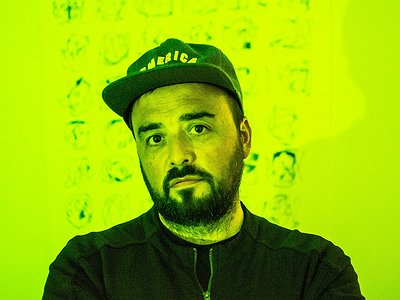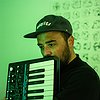Part 1
Name: Fernando Lagreca
Nationality: Uruguayan
Occupation: Producer
Current Release: Infamous on Beautiful Accident
Recommendations: I would recommend two Spanish graphic and visual artists, one is a young artist from Barcelona, called Alberto de Blobs (@albertodeblobs) and the other is GaAs from Gijón (@gaasdesign). Cheers!
Website / Contact: If you enjoyed this interview with Fernando Lagreca, keep up his with his activities, productions and tour dates via his facebook profile and bandcamp store.
When did you start writing/producing music - and what or who were your early passions and influences? What what is about music and/or sound that drew you to it?
I’ve always been surrounded by music, my dad was musician and I recall always was something of music at home or in family meetings, some uncle used to play drums, some other played a bit of guitars (all in amateur way) and my auntie was purchasing vinyls all the time so at a really early age I listened to The Beatles, Pink Floyd and then lots of 80’s bands.
When I was 18 or so I sold lot of old stuff, including an old bike, to purchase my first synthesizer, a Casio CZ101, then I began to play in some techno-pop projects. My influences from the late ‘80s and 90’s were bands such as New Order, Depeche Mode, Kraftwerk, Orbital, The Orb, and some Drum’n Bass projects such as Roni Size, Goldie, LTJ Bukem, Adam F and so on. And of course some of the techno legends from the ‘90s: Richie Hawtin /Plastikman, Jeff Mils, Carl Cox, etc.
[Read our Richie Hawtin / Plastikman interview]
[Read our Jeff Mills interview]
For most artists, originality is first preceded by a phase of learning and, often, emulating others. What was this like for you? How would you describe your own development as an artist and the transition towards your own voice? What is the relationship between copying, learning and your own creativity?
I never went to music school, I asked my dad to buy me a keyboard, but he refused, stating that I should go first to learn music theory for at least 5 years and then, let’s see. Can imagine what this does to a 15 year old or so teenager mind? It was impossible to understand of course: Should I go to learn music theory and then, after 5 years, if everything goes well, will he purchase me a keyboard? Sorry but “no way!” I went for the punk strategy instead … declined his offer and became a sort of music rebel, getting into the different subcultures in town, from dark to new romantic, from techno to rave, and so on (laughs). Then, I started playing by myself, borrowing some gear from friends until I purchased my own, basic equipment. From then on, it was a complete auto-learning process.
I remember that age like an incredible discovery time, everyday playing a bit, trying to emulate on the keyboard the kind of songs I liked and trying to find out at the same time how to get into those sounds or these sequences and reading magazines to check what equipment the artists I liked would use. So in some way, emulation (I would not say copying) in my case was strictly linked to my learning curve and the developing process of my own creativity.
What were your main compositional- and production-challenges in the beginning and how have they changed over time?
Initially, my main problem was that most of the bands or artists I liked (which I discovered in the mid 90s in Uruguay, so pre-Internet and computer era in a not particularly rich country at that time) were using a lot of gear that was absolutely unaffordable for me. I was at University and had a job during the day and spent all my money on books, music and gear, but nonetheless it was really complicated to get access to cool synths.
It was a time in which I had a real idea how they create music but I did not have the means to realise it. So it was super frustrating but motivating at the same time, cause was something like an objective to fulfill. Fortunately, the 90s went by and by end of the decade my studio had grown a little and I had a laptop with some sequencing software (Acid and Cakewalk initially) plus a couple of nice synths and grooveboxes that made me happy! Then I sold all the stuff when I came to Spain by late 2002 and started again to build a new gear collection. But that is another story.
What was your first studio like? How and for what reasons has your set-up evolved over the years and what are currently some of the most important pieces of gear for you?
My first keyboard was a Casio CZ101. Then I added an old Kitten Analog synth from Octave. This is a synth from the late 70s, USA manufactured, and it sounded terrible cause it was totally detuned. But it was perfect for sound efx. Then I added some rhythm boxes from Boss and Zoom, a Roland groovebox, a Yamaha CS2X synth plus a laptop with some sequencer software (no audio card yet, I recall I recorded directly into the laptop sound interface). Then I sold everything to get the money to cover the travel costs to Spain in late 2002 and started from zero again.
My first piece of gear I bought in Spain was a Korg Electribe EMX1 (the black one) that I returned after 10 days (did not liked at all) or so and exchanged for a Roland Sampler SP303. That, plus the laptop and a Yamaha RMX1 groovebox was my first studio, along (this time finally yes) with a small audio card and monitors from M-Audio. Then my studio evolved and a lot of gear went in and out over the years.
Last year I did a list of all the gear I ever had – just for fun - and there's a lot of equipment listed on there, almost 100 different pieces of gear in total passed through my hands from my first CZ101 till now! Currently, my favourite weapons of choice in the studio are: Elektron Analog 4, Novation Bass Station 2, Nord Wave Synth, Elektron Octatrack and Moog Sub37… I own more gear but these are the favourites these days.
How do you make use of technology? In terms of the feedback mechanism between technology and creativity, what do humans excel at, what do machines excel at?
I use technology for different kinds of reasons in my general life. Of course since I write electronic music, there is an obvious link with technology implied, and on the other hand, all of us use technology on a daily basis. I mean, call it Netflix, YouTube, the mail app for work or the app I am using to answer this very interview.
Then, when it comes to creativity, technology plays a super important role today because it offers a super wide scope of technics and topics to be developed and used as help to express creativity. For me, it is still a matter of 50-50. Technology runs because humans and machines should help humans express themselves, so it should be a sort of balance. You're not using your tools well unless there is some sensible motive behind it all.
Production tools, from instruments to complex software environments, contribute to the compositional process. How does this manifest itself in your work? Can you describe the co-authorship between yourself and your tools?
Computers help musicians to write their music, as well as engineers to build that important bridge or – unfortunately - to set plans for guns or war weapons. When it comes to creativity, I trend to keep a more human and organic way to compose instead of basing all my music on algorithms or auto-generated patterns, etc. I enjoy using the technology to build my own samples and sound banks not only picking ready-made stuff and/or presets all the time.
I have nothing against presets and patterns; on the contrary, I use them as a useful tool to generate new things starting from what they offer and changing them and make them evolve into creative stuff. When I pick a synth or groovebox or sampler I try to extend their features, exhausting their possibilities to their boundaries - until I exchange them for other pieces of gear that offer me new visions and new ways to interact.
Collaborations can take on many forms. What role do they play in your approach and what are your preferred ways of engaging with other creatives through, for example, file sharing, jamming or just talking about ideas?
I haven't engaged in many collabs in my projects I have to say. I used to collaborate a lot with video artists and/or dancers in some projects. But it is not until a couple of years that I started to be involved in collaborative projects with other musicians and producers; the results are really interesting and I am very happy with how these collaborations went and also I think all of them were interesting because each of them was totally different.
Just to name a few, with a Belgium producer called Pedro Mercado I produced a couple of melodic techno tracks that worked really well on the Beatport charts and everything was super natural. I did a structure and sent it to Pedro for his label (Chrom) and he liked it but asked me to change some parts. We then both realised that it would be easier if I simply sent him the stems, so he could apply the changes he proposed. This is how two new tracks were born and we decide to send them to another label (Dear Deer) to be released there … After this sort of ‘accident’ we decided to work like that in more tracks and that is what we are doing now …
With another producer (Nachap, from Barcelona) it was different. He sent me a loop with some elements, I created something on top, sent it back and he completed the tunes. This also worked well. Then I did another collab last year with Julio Navas, one of the electronica pioneers in Spain and a good friend of mine. I went to his studio and we worked there a bit.
For my next album, I am including some featured vocals from users of platforms such as Looperman, who allowed their vocal riffs and acapellas to be used by the community. Then, you can talk to them, ask for the credits, propose changes, etc etc … so that's a totally different way to find collaborative options.onary scenario anymore!






